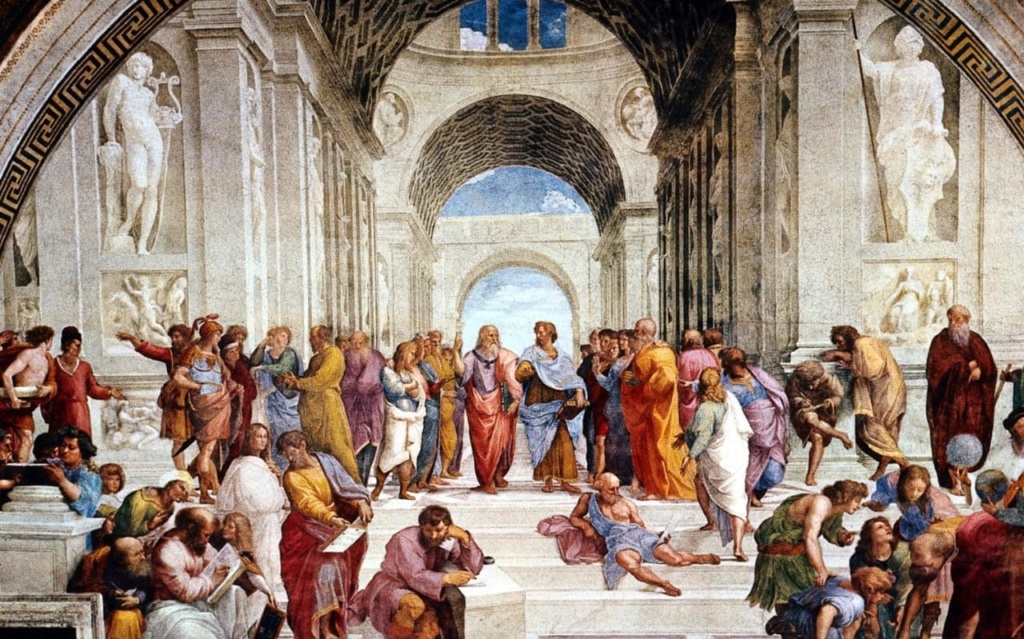
Greek scholars discussing the ideas of Aristotle and Plato are depicted in Raphael’s “The School of Athens”. The great works and achievements of the Greeks were partly lost to Western Europeans for centuries.
Astronomy is an area where the Greeks displayed a remarkable talent. Observational astronomy, the main focal point where astronomy took an unprecedented leap in Greece, attempted to construct a model of the universe that could account for the observations made by Greek scholars. They explored all imaginable alternatives, and carefully accounted for several different solutions of the various astronomical problems they came across.
These brilliant scholars anticipated several ideas for modern astronomy, so advanced for their time that some them endured for around two millennia. Even at the time of Isaac Newton, some aspects of Aristotelian cosmology were still taught at the University of Cambridge, England.
The development of astronomy by the Greeks and, by extension, the constellations, is considered by many historians to be a major chapter in the general history of astronomy. Before the 4th century BCE, knowledge of Greek astronomy is limited, in fact it is somehow incomplete, just a few manuscripts and writings survived.
The Greek contribution to science and mathematics, specifically to astronomy, is widely known and characterized from the start by the search for rational, physical explanations for observed celestial phenomena, phenomena such as the motions of the planets or “Wandering Stars”, as the Greeks referred to them.
Despite the general consensus of the Earth-centered model, also known as geocentrism, many scholars had reasons to believe that the model was not fully accurate, and hence needed corrections.
 Aristarchus of Samos (310 – 230 BCE), a Greek astronomer and mathematician, was the first to propose alternative astronomical hypothesis addressed some of these concerns. It turned out to be the correct explanation for the motions of the planets against the fixed backdrop of stars. Aristarchus’ life and ideas predated Copernicus by almost 1,700 years and, without any technology to empirically verify his ideas, he correctly described planetary motion as being based on a “Helio” or “Sun” centered solar system, an idea often attributed to Copernicus as being the first.
Aristarchus of Samos (310 – 230 BCE), a Greek astronomer and mathematician, was the first to propose alternative astronomical hypothesis addressed some of these concerns. It turned out to be the correct explanation for the motions of the planets against the fixed backdrop of stars. Aristarchus’ life and ideas predated Copernicus by almost 1,700 years and, without any technology to empirically verify his ideas, he correctly described planetary motion as being based on a “Helio” or “Sun” centered solar system, an idea often attributed to Copernicus as being the first.
Most constellations of the northern hemisphere derive from Greek astronomy, as do the names of many stars, asteroids, and planets. Scholars have determined that the Constellations probably originated with the Sumerians and Babylonians and that this idea, to immortalize human mythology and history in the stars, made its way to Egypt most likely by way of the Minoans on the Greek island of Crete. Subsequently, as these ideas spread throughout the region, the Greek scholars learned of them and began to write about them.
The Greek achievements in politics, arts and philosophy were great contributions, but there’s no doubt that the Greeks major legacy and contribution was their astronomical achievement. Not only did they develop the fine astronomical knowledge that we still use to this day, but also, the successful exploration and collection of astronomical data they acquired from Egyptian, Babylonian, and Chaldean astronomy created a merger of knowledge that allowed them to achieve a remarkable superiority.



